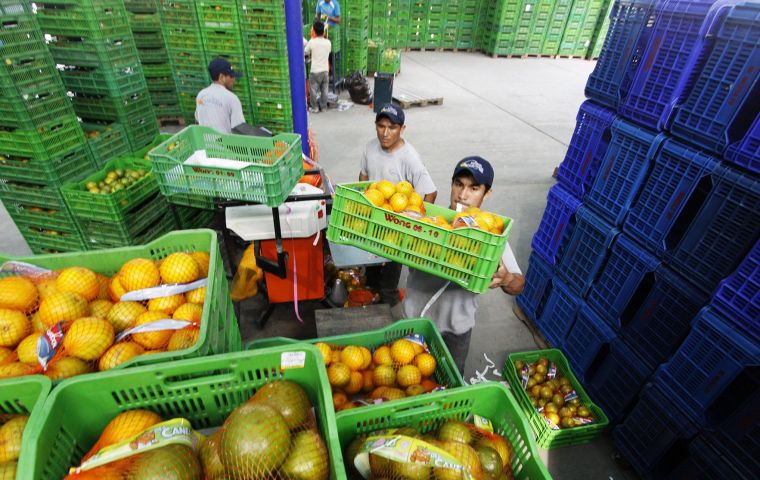MercoPress. South Atlantic News Agency
A smaller EU, (without UK), and Brazil negotiating new quotas and export volumes
 Brazil’s sugar export quota dropped from 388.12 thousand tons to 341.55 thousand tons, with the remaining volume redirected to the United Kingdom.
Brazil’s sugar export quota dropped from 388.12 thousand tons to 341.55 thousand tons, with the remaining volume redirected to the United Kingdom. Brazil and the European Union (EU) have reached a bilateral agreement on agricultural commodity quotas to adapt them to the bloc’s change in size following the Brexit departure of the United Kingdom. Under the new agreement, EU will reduce quotas, but, in return, UK decided to open others proportionately, thus preserving Brazil’s export window for both markets.
Brazil has access to several export quotas for sugar, chicken, beef, and turkey meat to the EU. Through this mechanism, Brazil enjoys lower tariffs for the export quotas.
Brazilian news agency Valor found that Brazil’s sugar export quota dropped from 388.12 thousand tons to 341.55 thousand tons, with the remaining volume redirected to the United Kingdom.
The EU opted for keeping the tariff reduction at 11 Euros/ton in the deal’s first year and 54 Euros/ton in the second year of the updated quota for Brazil, since Croatia entered the EU bloc.
In turn, another quota, which Brazil shares with other exporters, will go from 371,880 tons to 341,460 tons.
As for chicken meat (salted, processed, frozen, etc.), several quotas of exclusive use for Brazil will decline from 338.88 thousand tons to 244.27 thousand tons, a contraction of 27.9%. Conversely, with this drop in the EU, the quota in the UK will increase, bringing more Brazilian chicken sales to that market in the coming years.
Brazil’s quote for boneless beef, currently at 10 thousand tons, will drop to 8.95 thousand tons. The frozen beef quota Brazil shares with other markets will drop from 63,700 tons to 19,700 tons. As a result of this sharp drop, EU is committed to compensate by lowering tariffs from 20% to 15%.
EU’s overall grain quota has been changed from 278 thousand tons to 276.4 thousand tons. In other words, EU retains nearly all the volume at a lower rate. In the case of plywood, the quota in the EU drops from 650 thousand to 448.5 thousand tons.
The quota for the entry of table grapes at a lower rate was reduced from 1,500 tons to 885 tons. Brazil’s export quota of 1,500 tons of orange juice is specific to the EU and remains unchanged. In turn, the export quota for juices, in general, decreased from 7.04 thousand tons to 6.55 thousand tons.
Following the conclusion of the talks between Brazil and the EU, the Europeans must now obtain internal approval before signing the agreement, which may take months. However, to avoid a mismatch between the two and losses for the exporter, the process should coincide with the implementation of quota agreements with the United Kingdom.
Negotiations between Brazil and the United Kingdom are well advanced on the volumes of agricultural quotas that London will open. On October 5, there will be fresh negotiations.




Top Comments
Disclaimer & comment rulesCommenting for this story is now closed.
If you have a Facebook account, become a fan and comment on our Facebook Page!